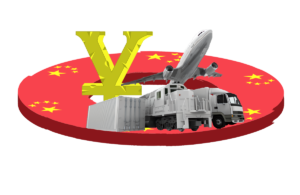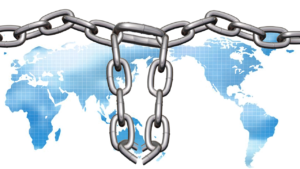Most analysts believe that globalization will continue to sweep across the globe like Noah’s flood. Countries that survive and prosper will be those that climb aboard the ark of connectivity and adhere to some basic rule sets. There is ample evidence that this course of action can help populations mired in poverty raise their standard of living. An article in USA Today, however, indicates that some leaders continue to place sandbags around their country’s economy believing they have some insight into a better way [“Enthusiasm for globalization ebbs,” by David Lynch, 15 January 2007]. The sub-headline, “Economic conditions good, but gripes flow,” is telling. Lynch begins his article by noting a few of the areas where backsliding has begun.
“At home and abroad, globalization is under increasing stress. From Venezuela, where President Hugo Chavez announced plans last week to nationalize critical industries, to Thailand, which has imposed new controls on foreign capital, countries are embracing long-discredited economic strategies. In Geneva, multilateral talks aimed at a new global trade pact remain deadlocked.”
Most of those scenarios have more to do with holding on to political power than they do with fostering the global economy and bringing billions more people out of poverty. That is just as true in the United States as elsewhere. Lynch notes:
“The backsliding overseas comes as a new Democratic majority on Capitol Hill, which is intent on overhauling the Bush administration’s trade policy, is getting down to work. Many of the new Democratic lawmakers campaigned on so-called fair-trade platforms and are deeply skeptical of the free-trade strategies pursued by Republican and Democratic presidents alike for a generation. ‘The idea of globalization and continued societal embrace of openness seems to be in a very deep sense of crisis,’ says Rawi Abdelal, a professor at Harvard Business School. The ebbing enthusiasm for additional integration is particularly noteworthy coming after four consecutive years of global economic expansion. In the USA, unemployment is a low 4.5% and the Dow Jones industrial average closed Friday at a record high. Economic conditions elsewhere, from the mature economies of the European Union to developing markets in China and India, likewise are sunny. That’s what makes the pervasive gripes over globalization — the free flow of goods, services and capital across national borders — so striking.”
Were the world mired in a deep depression, the gripes would be understandable, or if globalization had only benefited wealthy nations. But neither situation is true. Lynch continues:
“As perhaps the world’s most globalized economy, the USA benefits enormously from increasingly integrated markets and financial flows. Foreign capital finances the U.S. current account deficit, effectively allowing savings-poor Americans to live beyond their means. Free trade boosts U.S. output by $1 trillion annually, $10,000 per U.S. household, according to the Peterson Institute for International Economics. Assuming continued progress knitting together national economies, there is more to come. By 2030, total world trade is expected to almost triple to $27 trillion, according to the World Bank. Trade as a percentage of total output will rise from about one-quarter to more than one-third. Uri Dadush, director of the bank’s international trade department, says including in the global marketplace once-excluded countries such as China, India and the former Soviet bloc is potentially a century-long process. ‘We are just at the beginning of this,’ he says. That’s what worries some people: 59% of Americans believe free trade costs more jobs than it creates, according to a 2006 poll by the non-profit German Marshall Fund of the United States. Today, shoring up public support for global integration ‘may be the most important economic challenge of our time,’ [Timothy] Geithner [president of the Federal Reserve Bank of New York] told a New York audience last week, adding that the task is complicated by rising income inequality and growing consumer financial insecurity.”
There are serious challenges. It has been well documented that productivity has far outpaced wage increases creating some of the inequality noted by Lynch. Unions are starting to stir as workers’ sense of unease and dissatisfaction grows. Lynch reports that they have reason to be concerned:
“The risk of a 50% drop in family income has more than doubled since the 1970s, according to Jacob Hacker, a Yale University professor. … If more workers today feel chilled by trade liberalization rather than cheered, they may have good reason. When the current era of global interdependence began with the 1991 collapse of the Soviet Union, only the jobs of low-skilled factory workers appeared threatened by foreign competition. Technological change, shrinking communication costs and falling trade barriers are exposing a growing share of the labor force to foreign competition. Many of the newly insecure are white-collar workers in service industries, including computer programmers, radiologists, copy editors and accountants. So far, despite controversy over ‘outsourcing’ in the 2004 presidential race, the number of jobs actually transferred overseas has been limited. But, ultimately, 28 million to 42 million service sector jobs could be at risk, according to Alan Blinder, former Federal Reserve Board vice chairman. ‘We have so far barely seen the tip of the offshoring iceberg, the eventual dimensions of which may be staggering,’ Blinder wrote in Foreign Affairs last year. Key Democrats say further liberalization is possible only if trade deals are rewritten to include labor and environmental standards and if voters’ financial anxieties are addressed.”
The fact of the matter is that jobs don’t simply flee to areas where cheap labor can be found. If that were true, Haiti would have a booming economy. An educated, skilled, and reliable workforce is required. Workers in such a force are not blind to exploitation. As middle classes grow, conditions improve. The Democrats want to frontload trade agreements to ensure better working conditions (meaning a more competitive labor market) from the get-go. That’s great if it works. The hope held out by globalization is that billions can be brought out of poverty. If workers are simply exploited to make the rich richer, globalization is more likely to result in global unrest than global prosperity. Enlightened corporate leaders can’t let that happen. They will balance profits with benefits and stock holder interests with worker interests. All of this will level the playing field. Trying to stop globalization’s advance, however, is not the answer to a better world. Lynch concluded his article by noting that trade policy could dominate the next presidential election.
“Among Democrats, there is a consensus that the U.S. needs a new approach to managing the ongoing remaking of international economic ties. At one extreme, the party’s populist wing, represented by newly elected Sen. Sherrod Brown, D-Ohio, wants to renegotiate long-settled treaties such as NAFTA and give Congress a greater role in writing new trade agreements. Free-trade supporters, on the other hand, including some who designed the Clinton administration’s economic policies, are eyeing a variety of measures aimed at promoting individuals’ economic security. Only by improving education, pensions and health care can public support for further liberalizing trade be maintained, say pro-trade experts at the Hamilton Project, a policy study group created by former Treasury secretary Robert Rubin at the Brookings Institution. No one has yet developed a full legislative proposal. And some, such as Harvard’s Abdelal, say it may be the 2008 presidential campaign before the issue is fully joined. But eventually the debate will occur. The aftershocks caused by adding more than 2 billion low-wage workers to the international labor pool, and the ever-growing interdependence of developed and developing countries, are rattling U.S. policies and institutions created for a much different world. ‘Globalization has outrun the normal dynamics of international trade, particularly how you approach it as a policy matter. … Everybody is just trying to figure out their response,’ says Robert Shapiro, a Washington consultant who oversaw economic policy for President Clinton’s 1992 campaign. ‘This is a large change in how the world works.'”
What Shapiro says is true. Both technology and the economy development have outpaced policy development. There now exists what my colleague Tom Barnett calls a rule set gap. A rule set reset is needed and it can’t be achieved in isolation. The U.S. must engage with others (rich and poor countries alike) to help bring about rules that will help keep globalization on course. The Democrats appear a bit too divided to make that happen during this congressional session. Let’s hope leaders emerge with vision necessary to work together to close the rule set gap before unrest gets out of control and globalization stalls. Such an eventuality would benefit no one. New rules are an important part of Global Resilience and the kind of issue that will hopefully be taken up by the new Institute for Advanced Technologies in Global Resilience (IATGR). For another take on the article, see Tom Barnett’s post [The Gist of the Times].




